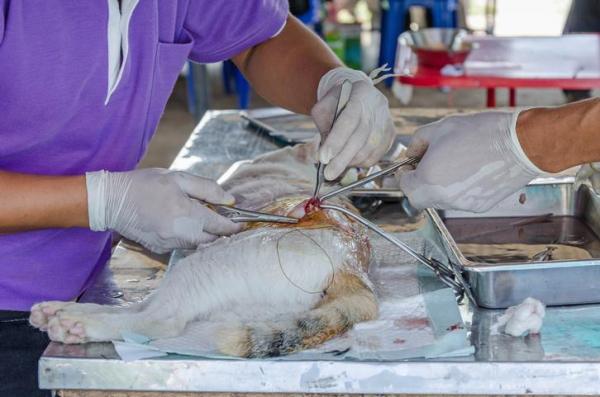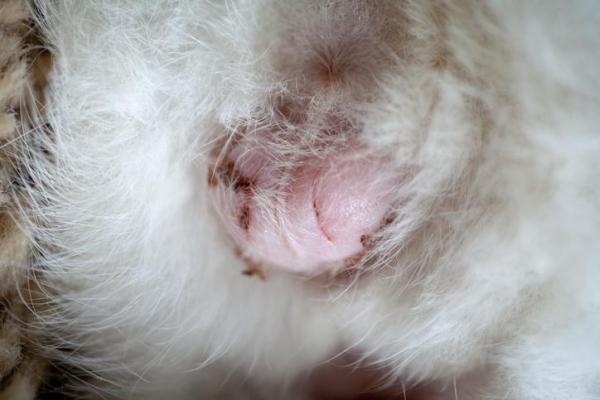Neutering a Cat- Price, Side Effects, Advantages, Procedure



See files for Cats
Did you know that there are many benefits of neutering a cat? Cat castration is a common practice among many caregivers, specifically because it offers a cat significant benefits. You may be wondering, ‘‘Is neutering good for cats?’’ And the answer is yes! As with any procedure, however, there are side effects and consequences which every cat owner should be aware of.
This is why here at AnimalWised we want to discuss everything you need to know about neutering your male cat, which in scientific terms would be referred to as male cat castration. Keep reading here to discover the most common side effects, prices, advantages, disadvantages and procedure steps related to male cat neutering.
- Cat castration vs. cat sterilization
- Cat neuter: procedure
- What age to neuter a cat
- Cat neutering: aftercare
- Cat neutering: recovery
- Benefits of neutering a cat
- Male cat neutering: side effects
- How much does neutering your cat cost?
- Cat neutering near me
- Cat behavior after neutering
Cat castration vs. cat sterilization
In general, sterilization and castration are often spoken about as the same thing, but these two terms are different. So, what is the difference between cat castration and cat sterilization?
Neutering involves the removal of reproductive organs such as the testicles, the uterus and/or the ovaries. Sterilizing, on the other hand, refers to making a cat sterile, which can be achieved by neutering as well as with the use of techniques such as a vasectomy or tubal ligation.
In this article we’ll be focusing on castration, since it is the procedure most commonly carried out by veterinarians. It is important to remember that this procedure can only be carried out by a professional in a surgery room accompanied by anasthesia.
For more, we recommend reading our article where we discuss the benefits of neutering a cat.

Cat neuter: procedure
Castration in male cats consists of making a very small incision through which the testicles are removed. The procedure in females is somewhat more complex, since the incision must open several layers in order to enter the abdominal cavity to remove the uterus and ovaries.
In some cases, especially in street cats who are generally released as soon as they wake up, a veterinarian focuses on a more lateral approach, only removing the ovaries. This incision is usually smaller, and due to its location, their is a decreased risk of postoperative complications.
Veterinarians always aim to make the smallest incision possible, only suturing a little of the skin. These measures are taken for a quicker recovery with minimal complications.
You may also be interested in our article where we uncover how to know if a cat is sterilized.

What age to neuter a cat
So, what is the best age to neuter a cat? The best age to neuter a cat is before their first heat at around 5-6 months in both males and females. This will, however, depend on the time of the year, as cats are seasonal polyestrics, meaning that the more sunlight there is, the more frequently they will experience heat. For any doubts, we always recommend consulting your veterinarian, specifically because the best age to neuter a cat can depend on the individual.
It is also important to know that cat neutering is not only done to avoid unwanted litters, but it also virtually eliminates any risk of breast tumors and other common cat pathologies. In addition to this, neutering cats can also prevent cat urine marking, which normally occurs due when detecting another cat in heat. Additional cat in heat behavior symptoms include:
- Jealousy
- Nerves
- Constant meowing
- Marking
- Territorialism
- Aggression
- Destructiveness
For more, we suggest taking a look at our article where we discuss everything you need to know about a cat in heat.
Cat neutering: aftercare
Castrating and cat neutering is a very quick and simple procedure. Most newly operated cats continue their normal daily routine as soon as they get home. Neutering a cat aftercare is minimal. All you have to do is check that the incision is clean and appears to be closing well.
Since cats are self-grooming animals, you should try prevent your cat from licking the wound. However, since these such incisions are generally small and tend to close quickly, it is not always necessary to use an Elizabethan collar.
For more, read here about caring for a neutered cat.

Cat neutering: recovery
All cat owners should know what to expect after neutering a cat. Neutering a male cat is often more complicated than neutering a female cat. Although they both generally experience rapid recoveries, male cats require more attention during the postoperative period. Once the cat wakes up from anasthesia, you will be able to take it home. It is also common for a veterinarian to administer medication to prevent infections and pain.
Although in males it is not always necessary to use an Elizabethan collar, it is often applied to females. It is very important to check the incision regularly. If you notice any signs of infection after neutering a cat, such as inflammation, redness, suppuration or bad smell, we recommend consulting your veterinarian. This is also the case if you notice that your cat is not eating, has a fever or is lethargic.
Benefits of neutering a cat
Castration in cats prevents them from reproducing, since the hormones responsible for triggering heat in cats are eliminated. Thus, neither neutered males or females will manifest symptoms of heat in cats, which includes urine markings, falls, behavioral changes, deafening meows or fights. It’s also important to remember that during fights between cats, incurable diseases such as feline immunodeficiency and leukemia can be transmitted.
In addition, as there several pathological processes linked to these such hormones, by suppressing them, these are also avoided. For example, castrated female cats at an early age are practically protected from breast tumors. Additionally, pyrometers are also avoided as well as benign breast hyperplasia or psychological pregnancies. In males, castration removes the risk of testicular pathologies.
As you can see, there are many advantages of neutering a cat. In addition to tackling feline abandonment, we offer our cats the change to live a healthier.
Male cat neutering: side effects
As with any procedure or operation, there are some negative side effects to castrating cats, although they are minimal. Cat neutering can lead to weight gain, therefore after neutering your cat, its feeding needs to be monitored. Additionaly, mental and physical stimulation needs to be increased.
How much does neutering your cat cost?
Cat neutering costs will vary depending on whether it is a male or a female, since the complexity of the surgery is different. In addition, this amount may also vary depending on your location.
Before operating on any animal, a veterinarian will have to perform a blood test and an electrocardiogram. These tests are sometimes included in the price, but this too will depend on the clinic. Generally, however, cat neutering is more expensive for females ($300-$500) than males ($200 in a private clinic). In Europe, however, the price can vary from 100-200 euros for females and 50-60 euros for males.
Cat neutering near me
Occasionally, municipalities or veterinary clinics themselves develop sterilization campaigns in which castrations are carried out for free or at reduced prices. These are usually aimed at street or homeless cats, but sometimes they also include domestic cats.
If you are looking to adopt an already neutered cat, we recommend adopting a cat from your an association or kennel, where they make sure to neuter them when they are young.

Cat behavior after neutering
There are many myths surrounding neutering cats, but other than those side effects we’ve already mentioned, there are no other clinically proven side effects of neutering cats. Many of these myths claim that neutering a cat changes its character, diminishes its instincts and can frustrate a cat. These are, however, not true.
This article is purely informative. AnimalWised does not have the authority to prescribe any veterinary treatment or create a diagnosis. We invite you to take your pet to the veterinarian if they are suffering from any condition or pain.
If you want to read similar articles to Neutering a Cat- Price, Side Effects, Advantages, Procedure, we recommend you visit our Prevention category.
- Campos Cervera, M.; García Roselló, E. Ventajas e inconvenientes de la esterilización. Ateuves nº 28, págs 28-32.








